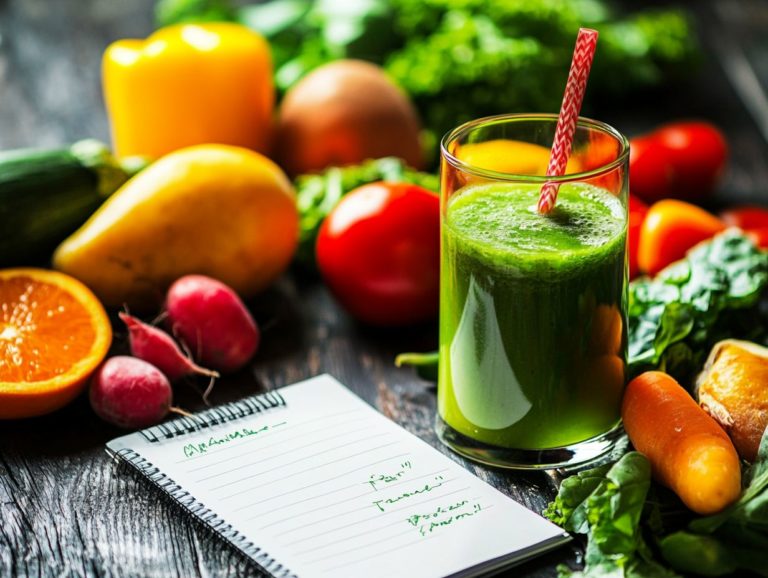The Best Practices for Post-Detox Care
Completing a detox is merely the beginning of your journey to recovery.
The significance of post-detox care is paramount; it is essential for maintaining the progress you’ve achieved and ensuring a healthier future ahead.
This article delves into key strategies for physical well-being, emphasizing the importance of nutrition and exercise, alongside mental and emotional support through therapy and effective coping mechanisms.
It highlights the value of nurturing social connections, implementing lifestyle changes, and skillfully managing relapse triggers.
By embracing these practices, you can cultivate a path toward lasting wellness and fulfillment.
Contents
- Key Takeaways:
- The Importance of Post-Detox Care
- Physical Care After Detox
- Mental and Emotional Support
- Take the Next Step
- Social Support and Community Involvement
- Lifestyle Changes for Long-Term Success
- Avoiding Relapse Triggers
- Frequently Asked Questions
- What are the best practices for post-detox care?
- Why is following a healthy diet important in post-detox care?
- How does exercising regularly benefit post-detox care?
- What role do support group meetings play in post-detox care?
- Why is practicing self-care important after detox?
- When should professional help be sought for post-detox care?
Key Takeaways:

- Prioritize post-detox care to support your recovery from addiction.
- Focus on proper nutrition and exercise to improve overall health and reduce the risk of relapse.
- Seek mental and emotional support through therapy and coping strategies, while fostering connections within a strong community to aid in maintaining sobriety.
The Importance of Post-Detox Care
Post-detox care is an essential phase in your recovery journey as you navigate the complexities of overcoming substance use disorders. This stage lays the groundwork for sustainable healing and long-term sobriety.
After completing a detox program at a facility like Pine Tree Recovery Center, you may encounter various challenges. These can include managing discomfort when stopping substance use, emotional upheaval, and the ever-present risk of relapse. That’s why it’s crucial to establish a well-structured aftercare plan, complete with ongoing support systems. Incorporating the best practices for digital detox can also be beneficial. Don’t wait! Establish your personalized care plan now, tailored to your unique needs.
Why It’s Essential for Recovery
Understanding the importance of post-detox care is essential for your recovery, as it plays a key role in preventing relapse and fostering a sustainable journey toward wellness.
This phase is crucial as it equips you with coping mechanisms and emotional resilience, both of which are vital for navigating life s daily challenges. Several factors come into play here, including access to personalized care that addresses your unique needs think counseling, group therapy, and holistic approaches like yoga and meditation.
Community resources, such as support groups and local treatment centers, also significantly enhance this process. These elements not only create a strong support network for you but also promote accountability and commitment to your recovery journey, effectively lowering the chances of relapse.
Physical Care After Detox
Physical care after detox is crucial for you as it facilitates your transition into a healthier lifestyle and aids in recovering from the physical effects of substance use, especially when it comes to alcohol withdrawal.
Prioritizing this phase can significantly enhance your overall well-being and set a solid foundation for lasting change.
Nutrition and Exercise Recommendations
Integrating proper nutrition and exercise into your routine is essential for promoting physical well-being and establishing healthy coping mechanisms during your recovery journey. These practices not only aid in repairing your body but also significantly enhance your mental health, providing you with a solid foundation for lasting lifestyle changes.
A balanced diet rich in whole foods think fruits, vegetables, lean proteins, and healthy fats can positively impact your mood and energy levels, both of which are crucial during recovery. Regular physical activity releases endorphins that help reduce stress and anxiety, further supporting your emotional stability.
By embracing these holistic approaches, you can create a nurturing environment that fosters resilience and improves your overall wellness, shaping a brighter path forward.
Mental and Emotional Support

Mental and emotional support is paramount in your recovery journey. As you navigate this path, you’ll encounter challenges that can significantly impact your mental health and emotional well-being, especially following detoxification.
Don t hesitate to reach out for support! Local resources and community connections can make all the difference in achieving lasting recovery.
Take the Next Step
Are you ready to take charge of your post-detox journey? Seek out the support you need and embrace the practices that will lead to lasting wellness and fulfillment.
Therapy and Coping Strategies
Effective therapy and coping strategies are essential when navigating the emotional complexities of recovery from addiction. These strategies assist you in managing your feelings and cultivate a deeper understanding of your triggers and responses.
A range of therapeutic approaches, such as cognitive behavioral therapy (CBT) and dialectical behavior therapy (DBT), equip you with valuable tools to enhance your emotional resilience. Community resources, including support groups and alumni programs, play a pivotal role in your journey. They create a sense of belonging and shared experience among those who are on similar paths.
These programs often feature workshops and peer mentorship, enabling you to develop coping skills that further strengthen your recovery and emotional well-being.
Social Support and Community Involvement
Social support and community involvement play crucial roles in your recovery journey. They establish a network of encouragement and accountability that can be instrumental as you navigate the challenges of overcoming addiction.
Building a Support System
Creating a robust support system is essential for you on your recovery journey. It offers the encouragement and accountability needed to navigate challenges effectively.
The path to healing can often be riddled with obstacles. It’s vital for you to surround yourself with individuals who truly understand your struggles. Family plays a critical role in this process, providing unconditional love and acceptance that can be transformative during difficult times.
Similarly, peer support groups offer shared experiences that foster empathy and understanding. They create a safe space for you to express your feelings without fear of judgment. Together, these relationships strengthen your resilience and cultivate a positive environment where you and others can thrive and heal.
Lifestyle Changes for Long-Term Success
Making important lifestyle changes is essential for you to achieve long-term success in your recovery journey. These changes serve as the foundation for a healthier, substance-free life, guiding you toward a brighter future.
Creating Healthy Habits and Routines

Creating healthy habits and routines can significantly elevate your recovery journey and fortify your resilience against potential relapse triggers. These are situations or feelings that can lead you to relapse or return to substance use.
Establishing a structured daily routine offers a sense of stability and alleviates uncertainty, which can often give rise to anxiety and stress. By incorporating regular exercise, balanced nutrition, and mindfulness practices, you lay down a solid foundation for your well-being. These elements harmonize to cultivate an environment where your emotional health can truly thrive.
Routines can enable you to develop essential coping strategies for navigating life s challenges. By consistently engaging in positive activities, you pave the way for a sustainable recovery path that leads to long-term success and fulfillment.
Avoiding Relapse Triggers
Avoiding relapse triggers is a crucial part of your recovery journey. By identifying and managing these obstacles, you can significantly improve your chances of maintaining long-term sobriety.
Identifying and Managing Triggers
Identifying and managing triggers is a vital skill for you on your recovery journey. It enables you to navigate situations that could lead to relapse. By recognizing these triggers be they emotional, environmental, or social you can take proactive steps to reduce your risks.
Employing techniques such as journaling your feelings, practicing mindfulness, and participating in supportive group discussions can significantly enhance your awareness of these cues. Building a strong support network is essential. Having trusted friends or counselors by your side provides the encouragement you need during challenging times.
Incorporating strategies like distraction techniques or positive coping mechanisms highlights the importance of developing resilience and fostering effective recovery. This approach ensures that you remain focused on your goals, paving the way for lasting change.
Frequently Asked Questions
What are common triggers for relapse?
Triggers can include stress, social situations, and negative emotions.
How can I find support groups?
Local recovery centers and online platforms often offer listings for support groups.
What lifestyle changes can help my recovery?
Incorporating regular exercise, maintaining a balanced diet, and practicing mindfulness are effective strategies.
Start your journey to recovery today! Reach out for help or join a support group!
What are the best practices for post-detox care?
Post-detox care involves several best practices. These include eating a healthy diet, exercising regularly, and attending support group meetings.
Why is following a healthy diet important in post-detox care?

A healthy diet restores essential nutrients. It supports physical and emotional healing after detox.
How does exercising regularly benefit post-detox care?
Exercising releases natural chemicals that help improve mood. This action reduces stress and anxiety, which are common triggers for relapse.
What role do support group meetings play in post-detox care?
Support groups provide a safe space to share experiences! They help in receiving guidance and accountability in recovery.
Why is practicing self-care important after detox?
Self-care involves taking care of your physical and mental well-being. It is essential for maintaining sobriety and improving quality of life in recovery.
When should professional help be sought for post-detox care?
If you re struggling to stay sober, seek professional help immediately! A therapist can provide essential support in your recovery journey.






